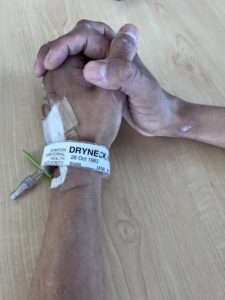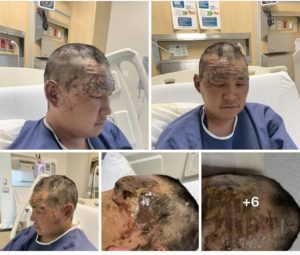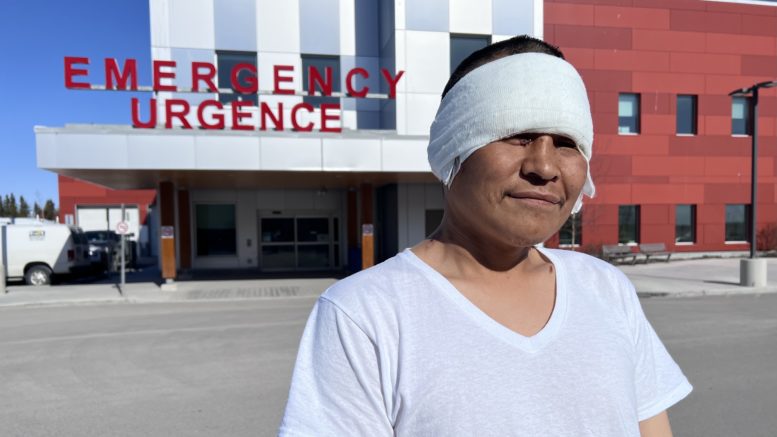Warning: Some scenes and imagery may be disturbing to some audiences.
Mark Dryneck spent hours roaming the streets of Yellowknife seeking shelter and aid but found none.
The night was April 10.
“I was freezing cold and I was feeling helpless,” he says. Dressed in only a long sleeve shirt, Dryneck tried his luck all around town. First at the gas station, then at the Sobering Centre, and then at the Salvation Army. His friends also turned him away.
In just a few hours, Dryneck became desperate and took fate into his own hands.
He grabbed a jerry can and poured its contents all over himself.
“I didn’t think it was gonna happen,” he says, “I just I flicked my lighter once and then that was it. Poof. I was in the flames.”

(Mariah Caruso/CKLB)
The next thing Dryneck remembers is waking up in the hospital with a foggy memory and severe burns and blisters on his head and face.
“Since this happened, now there are so many people that that are coming in and they want to do something about this,” he says.
Jen Bloss is Dryneck’s friend and court support worker. Since she posted his injuries on social media the response has been an outpour of community support and well-wishes.
Looking at those pictures, he says, makes him feel stronger.

Dryneck at Stanton Territorial Hospital following his episode. (Photos courtesy of Jen Bloss)
Dryneck says he plans to use this event to advocate for other street people, his friends. In the next few months, he will be receiving treatment in Edmonton and plans to continue advocating for others suffering from addiction and mental health issues once he returns to Yellowknife.
“I don’t like seeing my friends on the streets,” he says, “I’m planning to go to treatment and work on myself and once I work on myself i’ll come back and change things around.”
Dryneck calls on the territorial government for better harm reduction services, mental health facilities and treatment centres guided by Indigenous professionals.
Ultimately, Dryneck plans to highlight the mistreatment, neglect and prejudicial tendencies of northern treatment facilities.
Katrina Nokleby is the MLA for Great Slave and once she saw the post she said she was motivated to act.
She’s been visiting Dryneck in the hospital ever since and has been helping him transition into another facility.
The waitlist for residents to access a treatment program in the territory is four months.
“We’ve got to figure out where does Mark go in the meantime so that he can maintain sobriety and heal?” she says, It’s “shameful” to see how the government is handling this crisis.
Nokleby is committed to raising awareness on the issue and bringing his story to the Legislative Assembly. As part of her platform for re-election, she plans to implement five regional wellness centres across the territory, run by Indigenous organizations.
David Maguire is a spokesperson for the GNWT. Although he can’t speak to the specifics of this event, he did confirm that on that night emergency services were called outside the Sobering Centre.
“In rare cases, individuals who present a risk to staff or other clients or those who are presenting with significant disruptive behaviour may be asked to leave or denied entry. Service restrictions are used as a last-resort measure,” he says.





